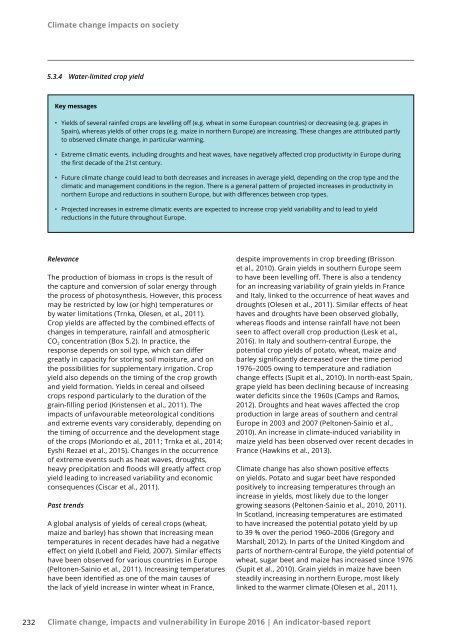Climate change impacts and vulnerability in Europe 2016
document
document
You also want an ePaper? Increase the reach of your titles
YUMPU automatically turns print PDFs into web optimized ePapers that Google loves.
<strong>Climate</strong> <strong>change</strong> <strong>impacts</strong> on society<br />
5.3.4 Water-limited crop yield<br />
Key messages<br />
• Yields of several ra<strong>in</strong>fed crops are levell<strong>in</strong>g off (e.g. wheat <strong>in</strong> some <strong>Europe</strong>an countries) or decreas<strong>in</strong>g (e.g. grapes <strong>in</strong><br />
Spa<strong>in</strong>), whereas yields of other crops (e.g. maize <strong>in</strong> northern <strong>Europe</strong>) are <strong>in</strong>creas<strong>in</strong>g. These <strong>change</strong>s are attributed partly<br />
to observed climate <strong>change</strong>, <strong>in</strong> particular warm<strong>in</strong>g.<br />
• Extreme climatic events, <strong>in</strong>clud<strong>in</strong>g droughts <strong>and</strong> heat waves, have negatively affected crop productivity <strong>in</strong> <strong>Europe</strong> dur<strong>in</strong>g<br />
the first decade of the 21st century.<br />
• Future climate <strong>change</strong> could lead to both decreases <strong>and</strong> <strong>in</strong>creases <strong>in</strong> average yield, depend<strong>in</strong>g on the crop type <strong>and</strong> the<br />
climatic <strong>and</strong> management conditions <strong>in</strong> the region. There is a general pattern of projected <strong>in</strong>creases <strong>in</strong> productivity <strong>in</strong><br />
northern <strong>Europe</strong> <strong>and</strong> reductions <strong>in</strong> southern <strong>Europe</strong>, but with differences between crop types.<br />
• Projected <strong>in</strong>creases <strong>in</strong> extreme climatic events are expected to <strong>in</strong>crease crop yield variability <strong>and</strong> to lead to yield<br />
reductions <strong>in</strong> the future throughout <strong>Europe</strong>.<br />
Relevance<br />
The production of biomass <strong>in</strong> crops is the result of<br />
the capture <strong>and</strong> conversion of solar energy through<br />
the process of photosynthesis. However, this process<br />
may be restricted by low (or high) temperatures or<br />
by water limitations (Trnka, Olesen, et al., 2011).<br />
Crop yields are affected by the comb<strong>in</strong>ed effects of<br />
<strong>change</strong>s <strong>in</strong> temperature, ra<strong>in</strong>fall <strong>and</strong> atmospheric<br />
CO 2 concentration (Box 5.2). In practice, the<br />
response depends on soil type, which can differ<br />
greatly <strong>in</strong> capacity for stor<strong>in</strong>g soil moisture, <strong>and</strong> on<br />
the possibilities for supplementary irrigation. Crop<br />
yield also depends on the tim<strong>in</strong>g of the crop growth<br />
<strong>and</strong> yield formation. Yields <strong>in</strong> cereal <strong>and</strong> oilseed<br />
crops respond particularly to the duration of the<br />
gra<strong>in</strong>‐fill<strong>in</strong>g period (Kristensen et al., 2011). The<br />
<strong>impacts</strong> of unfavourable meteorological conditions<br />
<strong>and</strong> extreme events vary considerably, depend<strong>in</strong>g on<br />
the tim<strong>in</strong>g of occurrence <strong>and</strong> the development stage<br />
of the crops (Moriondo et al., 2011; Trnka et al., 2014;<br />
Eyshi Rezaei et al., 2015). Changes <strong>in</strong> the occurrence<br />
of extreme events such as heat waves, droughts,<br />
heavy precipitation <strong>and</strong> floods will greatly affect crop<br />
yield lead<strong>in</strong>g to <strong>in</strong>creased variability <strong>and</strong> economic<br />
consequences (Ciscar et al., 2011).<br />
Past trends<br />
A global analysis of yields of cereal crops (wheat,<br />
maize <strong>and</strong> barley) has shown that <strong>in</strong>creas<strong>in</strong>g mean<br />
temperatures <strong>in</strong> recent decades have had a negative<br />
effect on yield (Lobell <strong>and</strong> Field, 2007). Similar effects<br />
have been observed for various countries <strong>in</strong> <strong>Europe</strong><br />
(Peltonen-Sa<strong>in</strong>io et al., 2011). Increas<strong>in</strong>g temperatures<br />
have been identified as one of the ma<strong>in</strong> causes of<br />
the lack of yield <strong>in</strong>crease <strong>in</strong> w<strong>in</strong>ter wheat <strong>in</strong> France,<br />
despite improvements <strong>in</strong> crop breed<strong>in</strong>g (Brisson<br />
et al., 2010). Gra<strong>in</strong> yields <strong>in</strong> southern <strong>Europe</strong> seem<br />
to have been levell<strong>in</strong>g off. There is also a tendency<br />
for an <strong>in</strong>creas<strong>in</strong>g variability of gra<strong>in</strong> yields <strong>in</strong> France<br />
<strong>and</strong> Italy, l<strong>in</strong>ked to the occurrence of heat waves <strong>and</strong><br />
droughts (Olesen et al., 2011). Similar effects of heat<br />
haves <strong>and</strong> droughts have been observed globally,<br />
whereas floods <strong>and</strong> <strong>in</strong>tense ra<strong>in</strong>fall have not been<br />
seen to affect overall crop production (Lesk et al.,<br />
<strong>2016</strong>). In Italy <strong>and</strong> southern-central <strong>Europe</strong>, the<br />
potential crop yields of potato, wheat, maize <strong>and</strong><br />
barley significantly decreased over the time period<br />
1976–2005 ow<strong>in</strong>g to temperature <strong>and</strong> radiation<br />
<strong>change</strong> effects (Supit et al., 2010). In north-east Spa<strong>in</strong>,<br />
grape yield has been decl<strong>in</strong><strong>in</strong>g because of <strong>in</strong>creas<strong>in</strong>g<br />
water deficits s<strong>in</strong>ce the 1960s (Camps <strong>and</strong> Ramos,<br />
2012). Droughts <strong>and</strong> heat waves affected the crop<br />
production <strong>in</strong> large areas of southern <strong>and</strong> central<br />
<strong>Europe</strong> <strong>in</strong> 2003 <strong>and</strong> 2007 (Peltonen-Sa<strong>in</strong>io et al.,<br />
2010). An <strong>in</strong>crease <strong>in</strong> climate-<strong>in</strong>duced variability <strong>in</strong><br />
maize yield has been observed over recent decades <strong>in</strong><br />
France (Hawk<strong>in</strong>s et al., 2013).<br />
<strong>Climate</strong> <strong>change</strong> has also shown positive effects<br />
on yields. Potato <strong>and</strong> sugar beet have responded<br />
positively to <strong>in</strong>creas<strong>in</strong>g temperatures through an<br />
<strong>in</strong>crease <strong>in</strong> yields, most likely due to the longer<br />
grow<strong>in</strong>g seasons (Peltonen-Sa<strong>in</strong>io et al., 2010, 2011).<br />
In Scotl<strong>and</strong>, <strong>in</strong>creas<strong>in</strong>g temperatures are estimated<br />
to have <strong>in</strong>creased the potential potato yield by up<br />
to 39 % over the period 1960–2006 (Gregory <strong>and</strong><br />
Marshall, 2012). In parts of the United K<strong>in</strong>gdom <strong>and</strong><br />
parts of northern-central <strong>Europe</strong>, the yield potential of<br />
wheat, sugar beet <strong>and</strong> maize has <strong>in</strong>creased s<strong>in</strong>ce 1976<br />
(Supit et al., 2010). Gra<strong>in</strong> yields <strong>in</strong> maize have been<br />
steadily <strong>in</strong>creas<strong>in</strong>g <strong>in</strong> northern <strong>Europe</strong>, most likely<br />
l<strong>in</strong>ked to the warmer climate (Olesen et al., 2011).<br />
232 <strong>Climate</strong> <strong>change</strong>, <strong>impacts</strong> <strong>and</strong> <strong>vulnerability</strong> <strong>in</strong> <strong>Europe</strong> <strong>2016</strong> | An <strong>in</strong>dicator-based report


